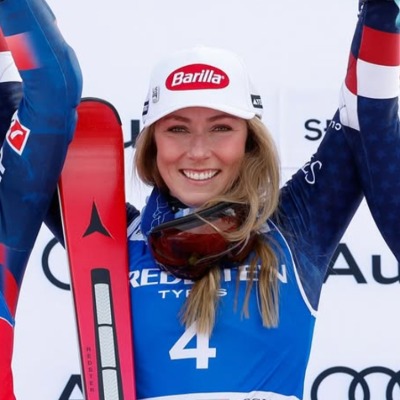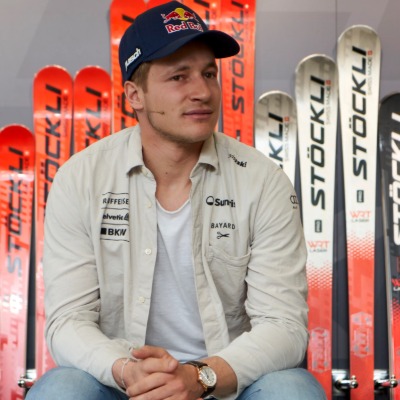Mac Bohonnon Retires From U.S. Ski Team

With nine World Cup podiums, including three victories; two Olympic appearances and one crystal globe spanning his 12-year career, aerialist Mac Bohonnon (Madison, Conn.) has decided to hang up his proverbial U.S. Ski Team hat.
Although growing up in a beach town, Mac learned to ski at just eighteen-months-old. The Bohonnons were weekend warriors and would pile into their family Vermont home, along with Mac’s aunt and cousins, to ski Bromley Mountain. After progressing through the mountain’s ski school program, Mac started out in the Alpine program. “I really did not like it,” he reflected. “Although I think the issue was that I was always wearing hand-me-down speedsuits. They were either too tight or too loose.”
Freestyle came casually to Mac at first, he and his brother and cousin would build jumps in their backyard, over the road, on the side of ski runs (much to the chagrin of Bromley’s ski patrol) and would “do all of the things parents hate,” Mac said. When he was about six or seven, Mac remembers his brother and cousin participating in Bromley’s first freestyle program, started by Brian Knowles. “Naturally I wanted to do whatever they were doing,” he added. “I just fell in love with freestyle from there.”
During his time at Bromley, Mac skied everything: moguls, slopestyle and big air (the name then for upright aerials). He started competing regionally in southern Vermont and grew to love the jumping aspect of freestyle. Mac’s brother eventually went to the Holderness School in New Hampshire to ski with the Nick and Wes Preston. The Prestons ran a highly-regarded freestyle program, especially in aerials, and Mac began to go to their Freestyle America camps. He eventually made it to Lake Placid, N.Y., to jump in the pool when he was old enough (at age 12). It was in Lake Placid that Mac learned to do a backflip.
Mac was recruited by Dmitriy Kavunov, the aerials development coach at Lake Placid at the time, who ran a program that would eventually become the Elite Aerial Development Program (EADP), to move to Lake Placid in October 2008.
“Looking back it was pretty crazy. I moved out of my parents house full time just before Thanksgiving of eighth grade. I always wanted to be a moguls skier so I was hesitant to commit to aerials full time. But as soon as I got up there I fell in love with the sport.” - Mac Bohonnon
Mac joined a class of aerial skiers that included Ashley Caldwell (Ashburn, Va.), Jon Lillis (Pittsford, N.Y.), Mikey Rossi (Long Valley, N.J.), Kiley McKinnon (Madison, Conn.) and Alex Bowen (Springville, N.Y.) who would not only all become his teammates, but his family.
In the summer of 2011 Mac’s aerials career almost came to an end. “I sucked, honestly that’s the only way to put it,” he said. “I was growing like crazy, I think I grew four inches and gained about twenty-five pounds. And I was really crooked, which is not good in aerials.” Mac struggled through the summer, working on correcting his form, but then finding his body had changed again a month later. In September of that year Mac remembers Dmitriy sitting him down and telling him he might want to stick to moguls. “I had already committed to not going to school that year. It’s hard when your coach of three years tells you you’re not cut out and never going to be successful at your sport.” But timing can be everything, and around that same time, Eric Bergoust, new coach for the EADP, stepped in. “He saved my career hands down. Bergy took me on as a kind of project and worked tireless with me.” But the summer of 2011 would always linger with Mac, “I was always a little bit crooked and it was something I always had to work on.”
Mac lived and trained in Lake Placid for four and a half years before he was recruited to the national team at age 16. Although resistant at first, Mac moved to Park City full time the summer of 2012.
Mac was unexpectedly shot into the spotlight during the 2013-14 season, the season he describes as “mind-blowing.” He recalls, “I did my first triples on snow in December 2013, and competed in the Olympics that next February.” Mac and his coach at the time, Joe Davies, had made the conscious decision together to work on fundamentals and stick to harder, double jumps, rather than go for triples during the 2012-13 season. Instead of gunning for the 2014 Winter Olympic Games in Sochi, they would focus on becoming the best for the four years following Sochi, leading into the 2018 PyeongChang Games.
“I had no expectations of going or competing in Sochi,” Mac says. “There were six guys on World Cup that season and I was not one of them. I don’t even think I had any World Cup starts that season.” But fate had other plans and after winning the first two Nor-Am events of the season, Mac earned two World Cup starts for the domestic stops at Deer Valley and Lake Placid - two of the three Olympic qualifying events. The third qualifying event was the Val St. Come World Cup in Quebec, Canada. “It was Friday night: Deer Valley, Tuesday: Canada and then Saturday: Lake Placid. One of the national team members had hurt themselves and bowed out of the Canada event. So at midnight before the team left for Canada, I got the call and bought a ticket.” Mac finished second in Val St. Come, the only podium for the men that year.
Upon returning to Park City, Mac remembers not wanting to get his hopes up about Sochi. Although he had the best results for the men that year, he thought there was no way he’d be chosen. “I was writing a paper for school on Ernest Hemingway’s For Whom the Bell Tolls - it was terrible - when I got the call from Todd Ossian. He said, ‘Hey Mac, what’s up…’ and then told me I was going to the Olympics and we’d start training in two days.” Mac’s mother was the first person he called with the news, to which she responded “well how in the world are you going to finish high school now?” Mac would go on to graduate from high school a few months after becoming an Olympian.
Mac was the only American male aerialist, and one of only three aerialists to compete for the U.S. (Ashley Caldwell and Emily Cook also represented the United States that year). Mac classified his Sochi experience as unique.
“I could treat it like just another event. I had no expectations for the Games and no one had any expectations of me. I think some people honestly thought it was silly I was there. I didn’t have a chip on my shoulder but I also wanted to prove that I should be there. It was a 10 out of 10 stars for me, I was just this young kid, still in high school, just so excited to be there.” - Mac Bohonnon
The night before his event, Mac did his first quad-twisting triple and took the crash of his lifetime, knocking himself out and bruising his lungs. However, he finished fifth in the Olympic finals, quite an accomplishment for an athlete many thought had no business being there.
In the season that followed, 2014-15, the old guard of the U.S. Aerials Team retired and Mac’s generation had their chance on the World Cup circuit. “We were such a close group and I know that played a big part in my success and our overall success that year. We went on tour with no expectations and just destroyed the competition each weekend. Every week, Kylie, myself or Ashley were on the podium. We just had so much much fun honestly.” The U.S. Aerials Team had a stand out performance that season, winning every piece of crystal possible, claiming the Nations’ Cup, and Mac and Kiley each took home globes for the overall title, as well as Rookie of the Year.
Aerials is as much about mental toughness as it is about athletic ability. “There was nothing that could crack my confidence in 2015. I think the mental side of things was always a strength of mine, which I attribute to Jo Davies. He introduced me to sport psychology and gave me tools to mitigate and deal with stress and fear. Because at no point are you ever really comfortable or complacent doing a tripe on snow.”
The the competition seasons that followed, Mac was unable to match the success of that storybook 2014-15 season. “I don’t feel like I became complacent. I know I trained just as hard and I even thought I got better. I was really happy with how I was jumping. But I just couldn’t compete well and that got frustrating.”
Leading into the 2018 Olympic Winter Games, Mac had high expectations for himself and for his teammates. Unlike his Sochi experience, Mac knew he had the ability to medal, and this time he was going with a team that was more like family, who also had the ability to medal. “Obviously I wanted to win and to do well. And if not me, then my teammates. You want to do well for the sport, for the U.S., for the team, for your coaches. The Olympics are every four years and that’s your time to shine.” Unfortunately, PyeongChang did not go as the U.S. team had hoped, with no Olympic medals in aerials.
After the Olympics, Mac knew he needed to take a step away from aerials and recharge. He decided to take the 2018-19 season off in hopes that his drive and passion he felt for the sport would return. “As I got further from aerials I just began to realize that the spark wasn’t coming back. I was equally as passionate about several other things that I hadn’t capitalized on for so long. And at the end of the day pursuing other passions won out.”
For the first time in eight or nine years, Mac was able to enjoy a ski season (and what a ski season it was in Utah). He skied Alta, which reminds Mac of his home mountain - a place for skiers.
Mac is currently studying at the David Eccles School of Business at the University of Utah in their entrepreneurship program. He’s unsure of what exactly is next for him, which is challenging, but knows he’d like to run his own business one day, among other things.
“Since I was 10 years old I’ve known exactly what I wanted and exactly what I needed to do to get there. And now to be in a kind of free for all is a bit intimidating, but gets to be more and more comfortable as I hone in on what I’m good at and what I’m not good at and figure out what brings me joy.” - Mac Bohonnon
Mac admits to holding out hope on returning to the Ski Team for a bit longer than necessary, but as the team is about to start prep on its 2019-20 season, he knew the time had come to close this chapter. “My advice to young aerialists out there is to enjoy it while it lasts. I was lucky to have a long and healthy career and it’s been the highlight of my life, but it felt like it went by in the blink of an eye.” His more direct advice is to not underestimate the mental side of aerials. “We train technical skills, why wouldn’t you train your brain to handle the pressure, to deal with the fear and the emotions? Set routines that make you feel confident.”
Reflecting on his career as an elite aerial skier, Mac can’t single any one person out on having the biggest impact on him. He recognizes his family in supporting him from day one, for always encouraging him to follow his dreams. He’s grateful to the many coaches he’s had: from the Prestons getting him into aerials, to Eric Bergoust for saving his career, to Joe Davies who took him from a pretty good development athlete to the person to beat for a while, to to Matt Saunders and to Todd Ossian who he won the overall title with. “I’ll never be able to thank those coaches enough for all that they did.”
Mac is also thankful for his agent, Sheryl Shade, and the many sponsors he’s enjoyed over the years. Oakley, Full Tilt, Oxess, who provided skis, boots, goggles and glasses, supported him all along, even before he had any major success. He’d like to thank his Olympic sponsors, Coca-Cola and Deloitte, who helped him become a double Olympian. He’s also like to recognize the support of the USOC and of U.S. Ski & Snowboard for the countless years of support. “I feel like I’ve lived in a U.S. Ski & Snowboard sanctioned building since I was twelve.”
You will now most likely find Mac on the golf course, a sport he describes as the most similar to aerials. “People look at me like I have 12 heads when I say that. But golf is a very mental sport. And you can think about your golf swing as your take off in aerials. You’re always having to feel for those micro adjustments, just like in aerials.”
Mac Bohonnon enjoyed four years as an elite athlete on the U.S. Aerials Ski Team. His accomplishments include:
Olympic Experience
- Two-time Olympian (2014, 2018)
-
PyeongChang 2018, 17th (aerials)
-
Sochi 2014, 5th (aerials)
World Championship Experience
-
Most recent: 2017 – 10th (aerials)
-
Years of participation: 2015, 2017
-
Top finish: 10th – 2017
Other Career Highlights
-
2017 FIS World Cup Standings, 2nd (aerials), 10th (overall)
-
2016 FIS World Cup Standings, 10th (aerials)
-
2015 FIS World Cup Standings, 1st (aerials), 2nd (overall)
-
2014 FIS World Cup Rookie of the Year
-
2013 FIS Junior World Championships, 7th (aerials)
-
2012 FIS Junior World Championships, 5th (aerials)













